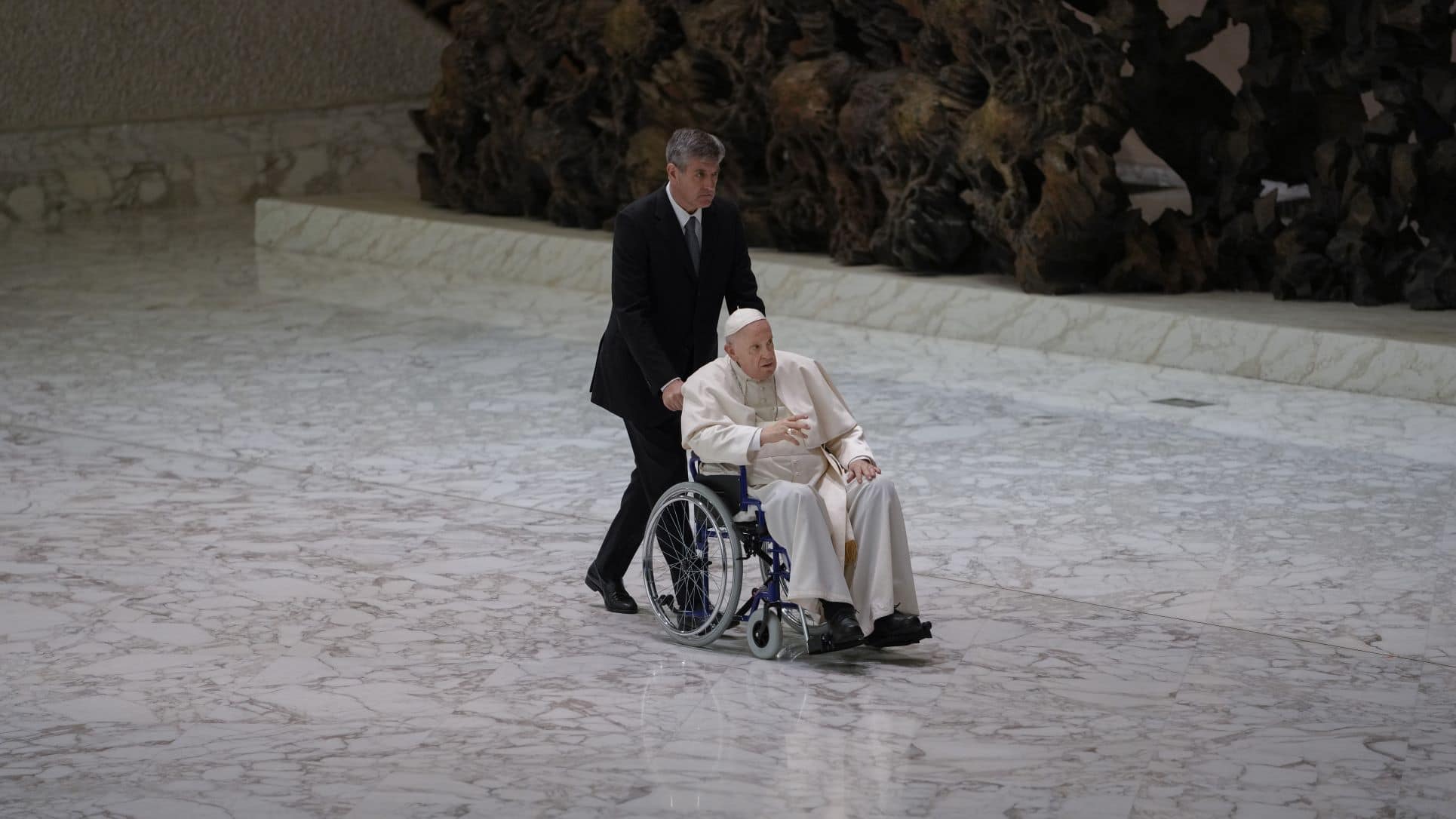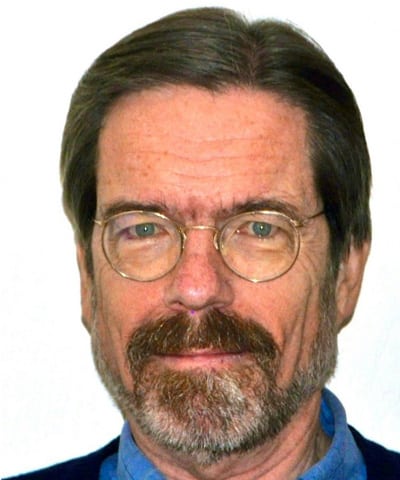Questions about Pope Francis’s health are stoking speculation about who might succeed him one day as head of the powerful Roman Catholic Church.

Pope Francis arrives in a wheelchair at The Vatican, 5 May 2022. Francis, 85, has been suffering from strained ligaments in his right knee for several months. (AP Photo/Alessandra Tarantino)
Get ready for the strangest election you’ll never see.
Nobody knows when the vote will happen. There are no declared candidates. The name of the winner is known only when he comes out to take a bow.
And yet he will instantly become one of the most familiar faces on Earth.
The election is the conclave, the secret vote for the next head of the worldwide Roman Catholic Church. The race for successor to Pope Francis has begun, and even tidbits of wild fantasy are eagerly lapped up by Vatican watchers.
Elaborate laws around the secret vote make it a strange election.
Speculation began in earnest in early May, when the 85-year-old pope appeared in public for the first time in a wheelchair. Pain in his knee made it difficult to stand or walk.
Since then, Catholic media — and sometimes the secular news business as well — have begun asking questions. Would he retire? When will he die? Who will succeed him?
Nobody knows. The papacy is modeled on Renaissance monarchies with the pope as the absolute ruler. He (yes, it has to be a man) is in office for life, surrounded by hand-picked advisors and ultimately answerable only to God.
There are doctrines, laws and customs to hem him in, but many can be reinterpreted. Every pope does it.
The main difference is that the pope is elected. The elaborate laws around the secret vote in the Sistine Chapel make this the strangest election I’ve ever seen in almost five decades as a journalist.
That includes at least 50 elections in six countries that I’ve covered as a journalist and around 15 others in three countries where I’ve voted.
Pope Francis refuses to say if he will retire or reign until death.
First, nobody knows when it will be. It used to come when the previous pope died. But Pope Benedict XVI broke that mold by stepping down in 2013.
Francis refuses to say whether he will retire or reign until his death. Maybe he’s waiting for Benedict, now 95, to die so there are not two retired pontiffs for the next one to deal with. That only fuels the speculation (see here and here and here).
After that comes tea-leaf reading about who the next pope might be. Church law says nobody can declare his candidacy. It is even forbidden for cardinals to privately drum up support for a favorite candidate, although that happens in various ways.
Once the doors to the Sistine Chapel are locked behind them, the cardinals are sworn to secrecy. They are not supposed to say what happens during the election. Their choice is not known until after white smoke billows from an unassuming chimney above the Sistine Chapel and the new pope appears on the balcony of St. Peter’s Basilica.
Despite that, Vatican watchers have been openly weighing the chances for individual cardinals (see here and here and here). Several bookmakers take bets on who’s ahead (see here and here). The best-known of them is Dublin’s Paddy Power, which is banned online in some countries.
It’s hard to say who cardinals will vote for.
Having covered both the 2005 and 2013 conclaves as religion editor for Reuters, I can say with certainty that this speculation can be dizzying.
Vaticanisti, as journalists at the Vatican are known, start by counting how many cardinals the current pope has appointed. If that number is two-thirds or more of the 120 electors, they conclude that someone like the outgoing pontiff has a good chance.
That worked reliably in 2005, by which time the just-deceased Pope John Paul II had appointed all but two of the voting cardinals. The conclave chose his right-hand man, Cardinal Joseph Ratzinger, to become Benedict XVI.
In 2013, with 67 cardinals appointed by Benedict and 48 by John Paul, a conservative should have won hands down. But the first member of the Jesuit order to be elected pope, Cardinal Jorge Bergoglio (as Pope Francis was known then) has changed the Church so much that many conservative Catholics openly oppose him.
Francis has picked just under two-thirds of the next conclave — the exact number changes as electors age out at 80 or the pontiff names new ones — so his successor could be a moderate reformer too.
The front-runner seems to be former Manila Cardinal Luis Tagle, now in Rome in charge of the Church’s missionary and charity efforts.
But Bergoglio’s showing in 2013, when most Italian newspapers did not include him among their main candidates, argues against that.
And as pontiff, Francis has chosen so many new cardinals from far-flung posts that many of them are unknown in Rome. It’s hard to say who they will vote for.
This pontiff loves surprises.
Cardinals are not supposed to show preferences. So Vaticanisti search for hints by politely asking questions like, “Your Eminence, what do you think are the main challenges facing the Church today?”
If they say “Africa,” where Christianity and Islam are growing quickly, the search turns to black cardinals for a candidate. In the past, it quickly zeroed in on Nigeria’s Cardinal Francis Arinze, who was a bookmaker’s favorite even though he did not make a strong impression in person.
Cardinal Peter Turkson of Ghana in now the favored African. He is more dynamic than Arinze, but his current high ranking among bookmakers may also be just speculation in search of a candidate.
If Francis retires, the assumption is that a conclave would be held within a reasonable delay, say a month or so. But this pontiff loves surprises and could allow much more time for discernment — the Jesuit buzzword for wise judgment — to take place.
Francis has made the next conclave even more difficult than usual to predict. Put down a bet now at your own risk.
Three questions to consider:
- Why are conclaves so secretive? (This article doesn’t answer that question, so do some internet sleuthing to find out.)
- Voting takes place with paper ballots that are burned after they are counted. The world first learns of a new pope when white smoke rises from the Sistine Chapel chimney. Should the procedure be updated in this internet age?
- Pope Francis is promoting more democracy in the Church. Should that extend to the conclave, and if so, how?

Tom Heneghan was a correspondent, bureau chief, regional news editor and global religion editor during his 40 years at Reuters, with postings in Vienna, Geneva, Islamabad, Bangkok, Hong Kong, Bonn and Paris. He covered the Soviet-Afghan war, two papal elections and Germany’s reunification, which he analyzed in his book “Unchained Eagle: Germany After The Wall”. Based in Paris, he now writes regularly for The Tablet in London and Religion News Service in Washington.

Hello Nelson,
Article très intéressant, vivant, pas trop long.
Salue pour nous Tom avec qui nous avons pu échanger quelques mots très instructifs sur les relations, à l’occasion du déjeuner que tu as organisés à la CIU.